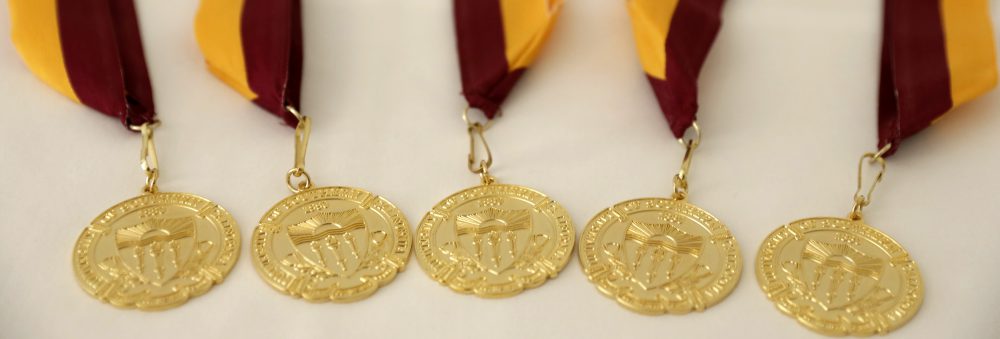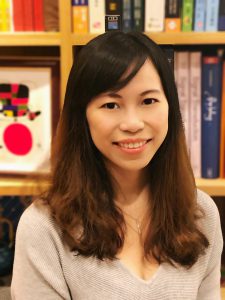Valentine’s Day isn’t just about showing love for your significant other, family, friends, or even yourself! USC Graduate School wants to take this day to show our appreciation for our global fellows, many of whom moved thousands of miles to continue their education at USC. Incoming students from China, India, Brazil, Taiwan, Mexico and Chile are eligible for the fellowships that are funded collaboratively by their home countries and USC. These opportunities help to ensure that international PhD candidates have access to everything they need to successfully conduct their research.
We’re excited to introduce some of our global fellows from Taiwan and Chile and to share their groundbreaking research.
Camille (Hsu-Yu) Chen is a Ph.D. candidate in the Programs in Biomedical & Biological Sciences (PIBBS) at Keck. She joined PIBBS because of its diverse and collaborative faculty members and the opportunities to explore sciences in different disciplines. Chen’s research focuses on HIV gene therapy, specifically targeting the latency of the infection. Through her research, Chen aims to eliminate HIV latency. Within her program, Chen works closely with experts in HIV and gene therapy research. Their collaborative efforts has supported her goal to eliminate HIV latency. The USC Taiwan Global Fellowship is funded in part by the Republic of China (Taiwan) Ministry of Education. The fellowship has provided Chen with the opportunity to stay up to date with the latest research pertaining to HIV.
“The USC Taiwan Global Fellowship has not only supported my study at USC, but it has also provided a travel award to attend conferences to learn about the most advanced findings in the field,” said Chen.
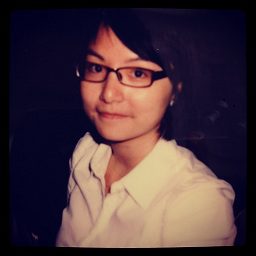
Li-Ping Chen is a Ph.D. candidate in the Comparative Studies in Literature and Culture program at Dornsife and is also funded in part by the Republic of China (Taiwan) Ministry of Education. The global prestige of USC and the diverse intellectual community encouraged Chen to become a Trojan. Her research examines East Asian, Sinophone and Asian Diaspora literature. Chen says her dissertation explores the cultural identity and national consciousness of Taiwanese writers in postwar Japan and North America, and how their literary writings responded to nativist models of ethnicity, language and homeland in the age of global capitalism and postcolonial displacement.
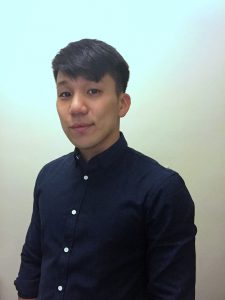
Kun-Hao Yu is a Ph.D. candidate and USC Taiwan Global Fellow in the Civil and Environmental Engineering program at Viterbi. Cardinal and gold are familiar colors to Yu. In 2017, Yu graduated from USC with a Master of Science degree in Civil and Environmental Engineering with a concentration on structural engineering. His experiences in the program encouraged him to return as a Ph.D. candidate.
“The experience volunteering in Dr.Qiming Wang’s lab during my M.S. degree at USC had established my strong interests in structural and mechanical engineering field,” said Yu.
Yu’s research focuses on mechanics and additive manufacturing of self-healing polymers. Recently, Yu and his colleagues developed analytical theories to explain their research on self-healing mechanics of dynamic polymers. Their works have been published in the prestigious Journal of Mechanics and Physics of Solids.
“These theories are the first set of analytical model in the field to mechanically explain the healing performance of the self-healing polymers,” said Yu.
Yu’s career goal is to become university faculty in Taiwan.
Ariel Calderon is a Ph.D. candidate studying Mechanical Engineering in the Viterbi School of Engineering. Calderon’s research is focused on robotics. In his soft robotics work, Calderon is designing systems that can mimic muscles in animals. A current project is a soft robot inspired by the way earthworms move. You can check out this video to see Calderon’s work in action. The robot contains artificial muscles that can contract and expand so the “worm” can move. In Calderon’s micro robotic work, he creates tiny robots. It’s is a meticulous process that involves using a laser cutter to cut shapes out of materials like carbon fiber and then manually assembling the shapes under a microscope. Recently, Calderon created a robotic bee that can flap its wing and fly. The bee is about the size of a penny.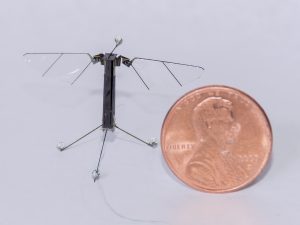
Calderon is one of USC’s Global Chile Fellows. He chose USC because it has one of the few labs in the world that can fabricate the kind of technology he is working on. “The Autonomous Micro-robotic Systems Labe in the AME Department was a great opportunity to learn and design robots that I’ve been dreaming about since I was a kid,” said Calderon.
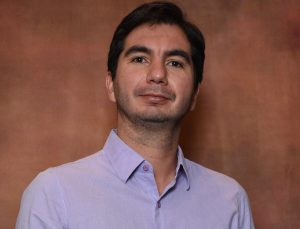 Rodrigo Riveros is a Ph.D. candidate in the Brain and Creativity Institute at USC’s Dornsife College of Letters, Arts and Sciences and another one of USC’s Global Chile Fellows. His research focuses on understanding how adolescents develop life goals. He primarily focuses on Latino and East-Asian teenagers. As part of his research, he conducts interviews and analyzes behavioral and neuroimaging data. Riveros also studies the effects of art-based social emotional intervention on adolescents and adults. Riveros says this work has inspired him to transfer his lab and community research into objective recommendations for social betterment.
Rodrigo Riveros is a Ph.D. candidate in the Brain and Creativity Institute at USC’s Dornsife College of Letters, Arts and Sciences and another one of USC’s Global Chile Fellows. His research focuses on understanding how adolescents develop life goals. He primarily focuses on Latino and East-Asian teenagers. As part of his research, he conducts interviews and analyzes behavioral and neuroimaging data. Riveros also studies the effects of art-based social emotional intervention on adolescents and adults. Riveros says this work has inspired him to transfer his lab and community research into objective recommendations for social betterment.
Riveros says he chose to pursue a Ph.D. at USC because of the opportunity to work with Dr. Immordino-Yang. “I felt deeply connected with Dr. Immordino-Yang’s scientific approach, conducting research that acknowledges the multiple levels and dynamics of human development with the highest standard of quality and rigor,” said Riveros.
